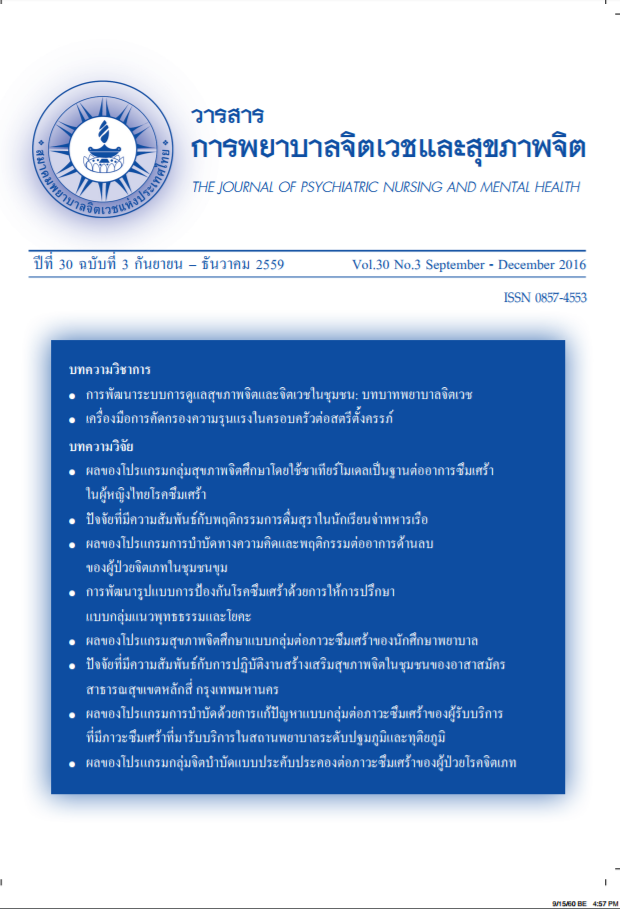ผลของโปรแกรมการบำบัดทางความคิดและพฤติกรรม ต่ออาการด้านลบของผู้ป่วยจิตเภทในชุมชน* THE EFFECT OF COGNITIVE BEHAVIORAL THERAPY PROGRAM ON NEGATIVE SYMPTOMS OF SCHIZOPHRENIC PATIENTS IN
Main Article Content
บทคัดย่อ
Abstract
Objectives: The purpose of this quasiexperimental pretest-posttest with control group research design was to examine the effect of cognitive behavioral therapy program on negative symptoms of schizophrenic patients in community.
Methods: Subjects were 40 schizophrenic patients, aged 20-59 years, at the out-patient department in a psychiatric hospital, Ministry of Public Health. They were matched pair with illness duration and score of psychiatric symptom and then randomly assigned to the experimental and control groups, 20 in each group. The experimental group received cognitive behavioral therapy. The control group received routine nursing care. Research instruments consisted of the cognitive behavioral therapy program, negative symptoms test and automatic negative thought test. All instruments were tested for content validity. Reliability of the negative symptom test and automatic negative thought test were .82 and .82, respectively. Data were analyzed by descriptive statistics, and t-tests.
Results: Findings were as follows:
1. The negative symptoms of schizophrenic patients in community after receiving the cognitive behavioral therapy program was significantly lower than that before (p < .05).
2. The negative symptoms of schizophrenic patients in community after received cognitive behavioral therapy program was significantly lower than that of those who receiving routine
nursing care (p < .05).
Conclusions: The results suggest that the cognitive behavioral therapy program is effective in reducing negative symptoms of schizophrenic patients. The program promotes patients’ new skill to identify negative thoughts, form adaptive thoughts, and alter maladaptive behavior patterns to adjust to particular situations.
บทคัดย่อ
วัตถุประสงค์: การวิจัยกึ่งทดลองแบบสองกลุ่มวัดก่อนและหลังการทดลอง มีวัตถุประสงค์เพื่อเปรียบเทียบอาการทางลบของผู้ป่วยจิตเภทในชุมชน ก่อนและหลังได้รับโปรแกรมการบำบัดทางพฤติกรรม ความคิด และอาการทางลบของผู้ป่วยจิตเภทในชุมชน ระหว่างกลุ่มที่ได้รับโปรแกรมการบำบัดทางพฤติกรรม ความคิดกับกลุ่มที่ได้รับการดูแลตามปกติ
วิธีการศึกษา: กลุ่มตัวอย่างคือผู้ป่วยจิตเภทอายุ 20-59 ปี ที่เข้ารับการรักษาแบบผู่ป่วยนอกที่สถาบันกัลยาณ์ราชนครินทร์กรมสุขภาพจิตกระทรวงสาธารณสุข จำนวน 40 คน แบ่งเป็นกลุ่มทดลองและกลุ่มควบคุม กลุ่มละ20 คน โดยจับคู่โดยจับคู่ระยะเวลาการเจ็บป่วยทางจิตและคะแนนอาการทางจิตเหมือนกัน กลุ่มทดลองได้รับโปรแกรมการบำบัดการบำบัดทางพฤติกรรมความคิด กลุ่มควบคุมได้รับการพยาบาลตามปกติเครื่องมือที่ใช้ในการวิจัยคือ1)โปรแกรมการบำบัดทางความคิดพฤติกรรม 2) แบบประเมินอาการทางลบ และ 3) แบบประเมินความคิดอัตโนมัติด้านลบ ซึ่งผ่านการตรวจสอบความตรงตามเนื้อหาค่าความเที่ยงของแบบประเมินอาการทางลบและแบบประเมินความคิดอัตโนมัติด้านลบ เท่ากับ .86 และ .82 ตามลำดับ วิเคราะห์ข้อมูลโดยใช้สถิติเชิงพรรณาและสถิติทดสอบที
ผลการศึกษา: ผลการวิจัยพบดังนี้
1. อาการทางลบของผู้ป่วยจิตเภทในชุมชนหลังได้รับโปรแกรมการบำบัดทางพฤติกรรมความคิด ต่ำกว่าก่อนได้รับโปรแกรม ฯ อย่างมีนัยสำคัญทางสถิติ (p < .05 )
2. อาการทางลบของผู้ป่วยจิตเภทในชุมชนกลุ่มที่ได้รับโปรแกรมการบำบัดทางพฤติกรรมความคิด ต่ำกว่ากลุ่มที่ได้รับการพยาบาลตามปกติอย่างนัยสำคัญทางสถิติ (p < .05 )
สรุป: โปรแกรมการบำบัดทางพฤติกรรมความคิด มีประสิทธิผลในการลดอาการทางลบของผู้ป่วยจิตเภท โปรแกรมส่งเสริมทักษะของผู้ป่วยในการบ่งชี้อาการทางลบ ปรับการคิดที่ถูกต้องและนำไปสู่การปรับพฤติกรรมและแสดงออกที่
เหมาะสมต่อสถานการณ์
Article Details
บทความที่ได้รับการตีพิมพ์แล้ว เป็นลิขสิทธิ์ของสมาคมพยาบาลจิตเวชแห่งประเทศไทย


